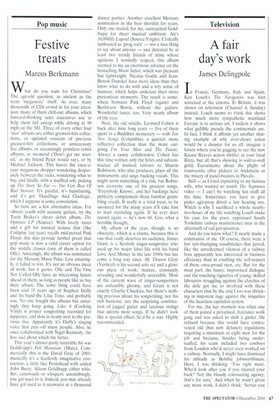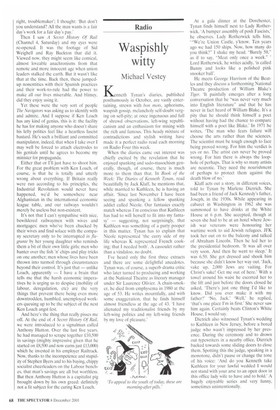A fair day's work
James Delingpole
In France, Germany, Italy and Spain, Ken Loach's The Navigators was first screened at the cinema. In Britain, it was shown on television (Channel 4, Sunday) instead. Loach seems to think this shows how much more sympathetic mainland Europe is to serious art. I reckon it shows what gullible pseuds the continentals are. In fact, I think it affords yet another shining example of why ever-closer union would be a disaster for us all: imagine a future where you're gagging to see the new Keanu Reeves action thriller at your local Ritzy, but all that's showing is wall-to-wall gritty Eurocinema about the plight of transvestite olive pickers in Andalucia or the misery of panel-beaters in Plovdiv.
Still — as I tried explaining to my furious wife, who wanted to watch The Sopranos video — I can't be watching fun stuff all the time. Sometimes, you have to give pinko agit-prop drivel a fair hearing too. Which is why I sacrificed a whole nearlytwo-hours of my life watching Loach make his case for the poor, oppressed South Yorkshire railway maintenance men in the aftermath of rail privatisation.
And do you know what? It nearly made a communist of me. Of course, there were a few tub-thumping unsubtleties that jarred, like the unredeemed vileness of a railway boss apparently less interested in business efficiency than in crushing the self-respect of these once-proud men, etc. But for the most part, the funny, improvised dialogue and the touching vignettes of young, skilled labourers struggling against the clutches of the dole got me so involved with these characters that by the end I too was shrieking in impotent rage against the iniquities of the heartless capitalist system.
For me, the key moment was when one of them joined a privatised, freelance work gang and was asked to shift a girder. He refused because this would have contravened old (but now defunct) regulations requiring a minimum of eight men for the job and because, besides being understaffed, his team included two cowboys from London who'd never even worked on a railway. Normally, I might have dismissed his attitude as Bolshie jobsworthiness. Here, I was thinking: 'Too right mate. Who'd look after you if you injured your back? Not the bloody contracting agency, that's for sure.' And when he wasn't given any more work. I didn't think: 'Serves you right, troublemaker'; I thought: 'But don t you understand? All the man wants is a fair day's work for a fair day's pay,' Then I saw A Secret History Of Rail (Channel 4, Saturday) and my eyes were re-opened. It was the footage of Sid Weighell and Ray Buckton that did it. Viewed now, they might seem like comical, almost loveable anachronisms from that remote and more innocent age when union leaders stalked the earth. But it wasn't like that at the time. Back then, these jumpedup nonentities with their Spanish practices and their work-to-rule had the power to make all our lives miserable. And blimey, did they enjoy using it.
Yet these were the very sort of people The Navigators was asking us to identify with and admire. And I suppose if Ken Loach has any kind of genius, this is it: the facility he has for making anyone who doesn't share his lefty politics feel like a heartless fascist bastard. He's such a brilliant and committed manipulator, indeed, that when I take over I may well be forced to attach electrodes to his genitals until he agrees to become my minister for propaganda.
Either that or I'll just have to shoot him. For the great problem with Ken Loach, of course, is that he is totally and utterly wrong about everything. If Britain really were run according to his principles, the Industrial Revolution would never have happened, we'd be somewhere near Afghanistan in the international economic league table, and our railways wouldn't merely be useless but non-existent.
It's not that I can't sympathise with nice, bewildered railwaymen with wives and mortgages; men who've been chucked by their wives and find solace with the company secretary only to be interrupted in flagrante by her young daughter who reminds them a bit of their own little girls; men who banter over the fish 'n' chips and play tricks on one another; men whose lives have been thrown into turmoil through circumstances beyond their control. It's just that — unlike Loach, apparently — I have a brain that tells me that the harsh economic imperatives he is urging us to despise (mobility of labour, deregulation, etc) are the very things that prevent there being even more downtrodden, humbled, unemployed workers queuing up to be the subject of the next Ken Loach angst fest.
And here's the thing that really pisses me off. At the end of A Secret History Of Rail. we were introduced to a signalman called Anthony Hutton. Over the last five years, he had managed to scrape together £10,500 in savings (mighty impressive given that he started on £8,500 and now earns just £13,000) which he invested in his employer Railtrack. Now, thanks to the incompetence and stupidity of Stephen Byers and to his baying, chippy socialist cheerleaders on the Labour benches, that man's savings are all but worthless. But then Anthony Hutton is a capitalist pig brought down by his own greed: definitely not a fit subject for the caring Ken Loach.























































































 Previous page
Previous page